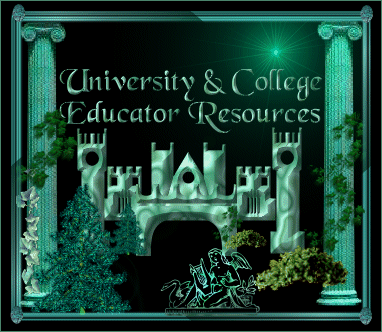
Index
Links to Explore
Academic Journals
Visions of Adonai Designs |

Feature Article
Technological Know-How
Dateline: 03/13/99
It would be a rare educator who has not been introduced to the recent wave of educational technology. Virtually, every education
related journal, course, and resource has some information related to using computers and technology for state-of-the-art teaching in higher education
environments. Greeted by some with open arms, technology also raises alarm bells in some educators for a variety of reasons. Some are concerned
that teachers will be replaced with computers. Others have an adversion to technology in general while others have little time to master the skills necessary to
even use a computer, let alone design a course or lessons on one.
The Future of Network Technology for Learning provides white papers and reports addressing
the key issues and initiatives that dominate the arena of educational technology. As with any big change, the advent of educational technology has introduced a slow but steady growth of a new educational paradigm.
The Internet has widened the impact of this paradigm shift in education, virtually making a "global classroom" a very plausible potentiality.
Students can interact and collaborate with other students in different schools, different cities, different countries and even different continents. The Reference Desk from Martindale's offers an astounding directory of educational
websites and learning experiences for faculty and students alike. These opportunities have catalyzed
a strong trend in higher education for technologically skilled faculty to both widen the scope of what they can offer students and
to help make the learning experience an interesting and important event in the teaching process.
Each educator has a unique set of skills and body of knowledge and theory which are used routinely in the education process. When it comes to technological skills,
how do you fare? Learning to use computers from scratch, can be a daunting task for novices. It is important to take it slow, and develop your knowledge
and skill at a comfortable pace. An excellent resource for getting acquainted with educational technology is at CTI: Changing the face
of University Teaching . With the latest computers available, this orientation process can be done quite painlessly - it just takes time and dedication.
A good place to start is to take an inventory of the computer applications that you feel the most comfortable working with;
which ones you know nothing about, and need intensive tutoring to master; and which ones would be the most useful to your teaching style and discipline of study.
Some potential applications to learn in order to teach in a progressive manner include:
A free on-line course for beginner Internet skills is offered at Tonic from Netskills
hosted by the University of Newcastle in the U.K. As well, Edupage offers summaries of
news in Instructional Technology three times a week, a site dedicated to transforming higher education through technology.
The ERIC Clearinghouse on Higher Education also provides ready access to an extensive database of educational materials on scores of topics.
Some examples of work being done with students in a virtual environment can be found at
The Skillful Scholar including information and resources for faculty and students
in Biology, Medicine, and the Health Sciences. Similar resources for subjects such as Art History, English, Religious Studies, and Languages are
located at The Virtual Media Lab . However you approach it, becoming literate and skillful in educational technology will enhance your teaching and prepare you for the 21st century classroom.
|